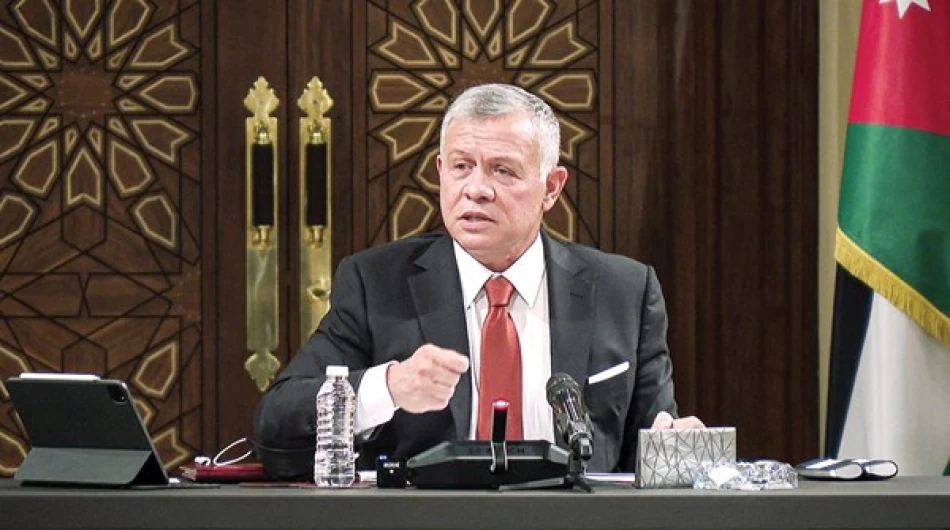
Jordanian King Urges Ensuring Aid Reaches Gaza Amid Humanitarian Crisis
Jordan's King Presses Trump on Gaza Crisis as Regional Partnerships Take Center Stage
King Abdullah II of Jordan has intensified diplomatic pressure on the United States to halt the Gaza conflict, emphasizing the urgent need for humanitarian aid access during a phone call with President Donald Trump. The conversation signals Jordan's strategic positioning as a key regional mediator while highlighting the deepening humanitarian crisis that threatens broader Middle Eastern stability.
Humanitarian Crisis Reaches Critical Point
The Jordanian monarch stressed the "necessity of exerting all efforts to stop the war on Gaza" and ensure aid flows to all areas of the Palestinian territory, which faces severe food shortages. The United Nations and international NGOs have repeatedly warned of impending famine conditions, making immediate intervention crucial.
Gaza's humanitarian situation has deteriorated to levels not seen since the territory's modern history, with basic necessities becoming increasingly scarce. The crisis extends beyond immediate survival needs, threatening long-term regional stability that directly impacts Jordan's security interests.
Strategic Diplomacy in Action
Jordan's Balancing Act
King Abdullah's approach reflects Jordan's delicate position as a key US ally while maintaining credibility with Arab populations increasingly critical of American Middle East policy. The monarch praised "US and presidential efforts in de-escalating tensions in the region," demonstrating diplomatic finesse in acknowledging Trump's role while pushing for concrete action.
This diplomatic strategy mirrors Jordan's historical role as a stabilizing force in the region, similar to how the kingdom navigated previous crises during the Arab Spring and Iraq conflicts. Jordan's refugee burden—hosting millions of Palestinians, Syrians, and Iraqis—gives the kingdom unique moral authority in regional discussions.
Economic Partnerships as Leverage
The call also addressed "enhancing strategic partnership between Jordan and the United States and expanding economic cooperation." This economic dimension suggests Jordan is leveraging its strategic value to the US while advocating for Palestinian relief—a calculated move that could yield both humanitarian and economic benefits.
Jordan's economic cooperation with the US includes significant aid packages and trade agreements, positioning the kingdom as a reliable partner in an unstable region. This economic interdependence gives Jordan's humanitarian appeals additional weight in Washington.
Regional Implications and Broader Context
The discussion of "developments in Gaza and Syria" indicates Jordan's comprehensive regional concerns. Syria's ongoing instability, combined with Gaza's crisis, creates a potential perfect storm for regional chaos that could overwhelm Jordan's capacity to maintain stability.
Jordan's proactive diplomacy contrasts with other regional players who have taken more confrontational or passive approaches. Unlike Saudi Arabia's recent diplomatic initiatives or Egypt's border management strategy, Jordan emphasizes direct humanitarian intervention while maintaining strategic partnerships.
What This Means for Regional Stability
King Abdullah's intervention represents more than humanitarian advocacy—it's a strategic calculation about regional order. Jordan's stability depends heavily on preventing the Gaza crisis from metastasizing into broader regional conflict or creating additional refugee flows.
The timing of this diplomatic outreach, early in Trump's presidency, suggests Jordan recognizes a potential window for policy shifts. The kingdom's emphasis on "peace that ensures security and stability for the entire region" positions Jordan as an indispensable partner for any sustainable Middle East strategy.
For international observers, Jordan's diplomatic activism signals that regional allies view the Gaza situation as reaching a tipping point where immediate action becomes essential for broader stability. The kingdom's dual focus on humanitarian relief and strategic partnership expansion demonstrates sophisticated statecraft in an increasingly complex regional environment.
Most Viewed News

 Layla Al Mansoori
Layla Al Mansoori






